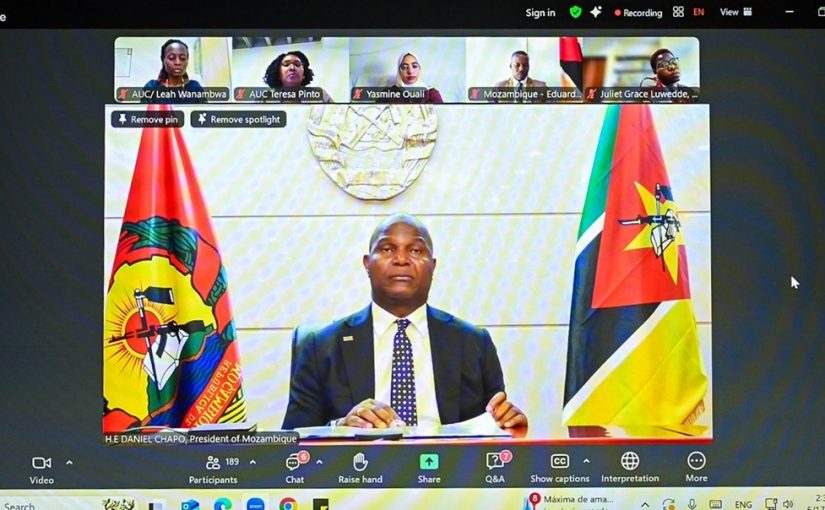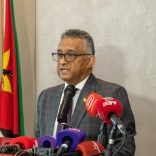Angola: 'Black cloud' of Mozambique post election conflict passed - president
Mozambique calls for immediate action to halt drought and desertification in Africa

Photo: Presidency
The President of Mozambique, Daniel Chapo, on Tuesday called for immediate and joint action among African countries to halt the “growing” threat of drought and the “relentless” advance of desertification on the continent.
“Across Africa, the growing threat of drought and the relentless advance of desertification are putting millions of people at risk,” warned the Mozambican head of state, arguing that it is necessary to “act now”.
The appeal was made from Maputo during a webinar promoted by the African Union (AU) on the occasion of the World Day to Combat Desertification and Drought, celebrated under the theme “Restore the Land. Unlock Opportunities”.
The event was attended by representatives of the member states of the African Union, representatives of the Presidents of the Regional Economic Communities, international partners and the Executive Secretary of the United Nations Convention to Combat Desertification (UNCCD).
President Chapo stressed that “solutions are within (…) reach” of the continent and acknowledged that desertification and drought are global challenges that affect millions of people, especially in Africa, “compromising food security, the availability of water resources and the survival of local biodiversity”.
“Southern African countries such as Zimbabwe, Zambia, Malawi, Mozambique and South Africa frequently face severe droughts induced by the ‘El Niño’ phenomenon. Paradoxically, countries in the Horn of Africa such as Ethiopia, Somalia and Kenya have been facing severe droughts for years, where the ‘La Niña’ phenomenon is observed,” he said.
According to Chapo, the El Niño, which hit the continent between 2023 and 2024, caused one of the “most severe” droughts in recent decades in Southern Africa: “More than 30 million people across the region have been affected, facing acute hunger, malnutrition and growing humanitarian needs”.
“The Greater Horn of Africa has seen the worst droughts in recent decades, leaving millions of people facing acute food insecurity, high rates of malnutrition – especially among children – and an increased risk of outbreaks of diseases such as cholera and measles, due to limited access to drinking water,” he said.
Chapo added that more than 45% of Africa’s territory is affected by desertification and more than 65% of arable land is at risk of becoming desert, which could lead to “serious consequences” such as food insecurity, conflicts over resources and massive displacement caused by hunger and poverty.
“But this does not have to be Africa’s fate. There is still hope and a way forward (…). Let us work together. Let us unite to restore Africa’s lands and, with them, pave the way for a future of dignity, stability and opportunities for all,” he stressed.
For Daniel Chapo, solutions to these climate crises include climate-smart agriculture, innovative disaster risk financing mechanisms such as sovereign insurance and anticipatory drought measures, as well as community-led reforestation efforts and large-scale initiatives such as “The Great Green Wall”, an initiative that aims to restore landscapes in the Sahel, a region south of the Sahara Desert, and combat desertification and climate change.
“Caring for our continent and its biodiversity can make a significant contribution to tackling the climate crisis and driving the achievement of the Sustainable Development Goals (…). By restoring degraded landscapes, we can create new livelihoods for rural communities, reduce the risk of forced migration, revitalize ecosystems and ensure long-term food security,” he added.
Mozambique is considered one of the countries most severely affected by global climate change, experiencing cyclical floods and tropical cyclones during the rainy season, but also prolonged periods of severe drought.
Between December and March alone, the country was hit by three cyclones, which, in addition to destroying thousands of homes and infrastructure, caused around 175 deaths in the north and centre of the country.
Extreme events caused at least 1,016 deaths in Mozambique between 2019 and 2023, affecting around 4.9 million people, according to data from the National Institute of Statistics.













Leave a Reply
Be the First to Comment!
You must be logged in to post a comment.
You must be logged in to post a comment.